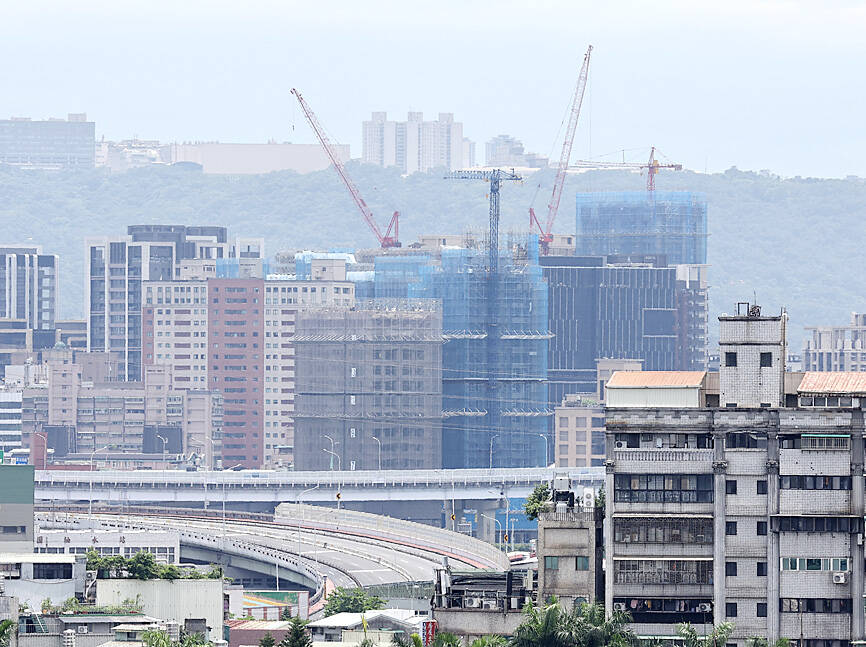The climate monitor for the presale and new housing market in northern Taiwan last month held steady for a 15th straight month, but approached the brink of a slowdown amid tepid new project launches and buying interest, My Housing Monthly has found.
The reading came in at 42.2, dropping 3.9 points from one month earlier and coming close to the threshold of 42 that indicates a sluggish state, the Chinese-language research publication said in a report released on Thursday.
“The market has a slim chance of improving this month as political uncertainty linked to the elections of local administrators and councilors dominates public attention,” My Housing Monthly research manager Chen Tsai-chi (成采錡) said.

Photo: CNA
Presale housing projects last month totaled NT$50 billion (US$1.55 billion), but only a few met the NT$1.5 billion threshold to qualify as large project launches, Chen said.
In Taipei, only three projects — two in Beitou District (北投) and one in Nangang District (南港) — met the criteria.
In New Taipei City, five projects in Banciao (板橋), Sanchong (三重), Sindian (新店), Linkou (林口) and Taishan (泰山) districts passed the threshold, it said.
Three projects in Taoyuan and one in Hsinchu also qualified.
At the same time, the market saw the entry of 100 newly completed apartment units, with only one building in Taipei’s Zongshan District (中山) valued at more than NT$1.5 billion, it said.
The data showed that developers sought to cope with listless sales by slowing the supply rather than cutting prices to facilitate transactions, Chen said.
Sales rates fell from 7.04 to 5.63, with 1.6 deals closed per week, compared with 2.1 in September, it said.
The reading on price concessions stood at 8.89, the same as one month earlier, with the room for price bargaining averaging 10.41 percent for presale projects, it said.
Housing reception sites saw fewer potential buyers at about 21.9 people per week, compared with 23.8 people one month earlier, it said, adding that heavy rainfall last month contributed to cooling buying interest.
Asking prices played an important role in determining buying interest, Chen said, adding that Taipei’s unaffordable housing prices scared away many prospective buyers.
Some reception sites in the capital saw no visitors at all, but suburban districts Beitou and Neihu proved the exception because of their relatively friendly asking prices, he said.

SELL-OFF: Investors expect tariff-driven volatility as the local boarse reopens today, while analysts say government support and solid fundamentals would steady sentiment Local investors are bracing for a sharp market downturn today as the nation’s financial markets resume trading following a two-day closure for national holidays before the weekend, with sentiment rattled by US President Donald Trump’s sweeping tariff announcement. Trump’s unveiling of new “reciprocal tariffs” on Wednesday triggered a sell-off in global markets, with the FTSE Taiwan Index Futures — a benchmark for Taiwanese equities traded in Singapore — tumbling 9.2 percent over the past two sessions. Meanwhile, the American depositary receipts (ADRs) of Taiwan Semiconductor Manufacturing Co (TSMC, 台積電), the most heavily weighted stock on the TAIEX, plunged 13.8 percent in

A wave of stop-loss selling and panic selling hit Taiwan's stock market at its opening today, with the weighted index plunging 2,086 points — a drop of more than 9.7 percent — marking the largest intraday point and percentage loss on record. The index bottomed out at 19,212.02, while futures were locked limit-down, with more than 1,000 stocks hitting their daily drop limit. Three heavyweight stocks — Taiwan Semiconductor Manufacturing Co (TSMC, 台積電), Hon Hai Precision Industry Co (Foxconn, 鴻海精密) and MediaTek (聯發科) — hit their limit-down prices as soon as the market opened, falling to NT$848 (US$25.54), NT$138.5 and NT$1,295 respectively. TSMC's

TARIFFS: The global ‘panic atmosphere remains strong,’ and foreign investors have continued to sell their holdings since the start of the year, the Ministry of Finance said The government yesterday authorized the activation of its NT$500 billion (US$15.15 billion) National Stabilization Fund (NSF) to prop up the local stock market after two days of sharp falls in reaction to US President Donald Trump’s new import tariffs. The Ministry of Finance said in a statement after the market close that the steering committee of the fund had been given the go-ahead to intervene in the market to bolster Taiwanese shares in a time of crisis. The fund has been authorized to use its assets “to carry out market stabilization tasks as appropriate to maintain the stability of Taiwan’s

In a small town in Paraguay, a showdown is brewing between traditional producers of yerba mate, a bitter herbal tea popular across South America, and miners of a shinier treasure: gold. A rush for the precious metal is pitting mate growers and indigenous groups against the expanding operations of small-scale miners who, until recently, were their neighbors, not nemeses. “They [the miners] have destroyed everything... The canals, springs, swamps,” said Vidal Britez, president of the Yerba Mate Producers’ Association of the town of Paso Yobai, about 210km east of capital Asuncion. “You can see the pollution from the dead fish.